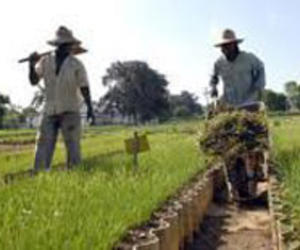Sustainable Agriculture and Urban Gardens in Cuba
- Submitted by: manso
- Business and Economy
- 08 / 24 / 2010

Research Delegation. November 12 - 21, 2010. "Since the early 1990's, Cuba has been engaged in the most comprehensive conversion from chemical to organic agriculture that any nation has yet attempted." -- Peter Rosset, Institute for Food and Development Policy.
Dear Friends and Colleagues,
We are inviting you to participate in our fall Sustainable Agriculture and Urban Gardens Research Delegation in CUBA, November 21 - 21, 2010.
http://www.globalexchange.org/tours/1044.html
In the early 1990's, Cuba's agricultural system and food supply were decimated by the collapse of the Soviet Union (which had supplied the majority of Cuba's food imports (chemical fertilizers and pesticides, fuel for transportation, feed for farm animals, and almost 60% of Cuba's food, as well as by the tightening of the U.S. embargo.
Cubans refer to these years as their "Special Period." Due to the severe shortage of hard currency for the importation of chemical fertilizers and pesticides, Cuba was forced, in the early 1990's to begin to practice organic agriculture on a nationwide scale; due to the shortage of fuel,they converted to a more locally-grown agricultural delivery system.
There are currently tens of thousands of organic gardens in Havana alone and over a million across the country.
In the late 1990's, the Cuban Association for Organic Agriculture was granted the International Right Livelihood Award (the Alternative Nobel Prize) for its efforts.
Organic agriculture continues to be supported and expanded at government and grassroots levels. Havana now grows well over half its fresh food organically and locally. Cuba hopes to be self sufficient in the production of most of its basic foods within the next decade.
All Cuban young people are introduced to agriculture and food production as part of their education, spending at least one summer during their high school years,farming in the countryside.
University graduates in agronomy are handsomely rewarded for contributing their knowledge of research, technology and administration in rural settings. This entices educated rural Cubans to return to the countryside by offering them stimulating and productive employment.
Global Exchange and the Institute for Food and Development Policy co-organized the first U.S. delegation to Cuba focused on sustainable agriculture in 1993, then co-authored the seminal book on the subject, The Greening of Cuba and collaborated on an award winning film of the same title.
In 2004-05 Global Exchange arranged the travel and interviews for the filmmakers of the award winning film, The Power of Community: How Cuba Survived Peak Oil.
Global Exchange organizes regular delegations of professionals, professors and practitioners of organic agriculture to Cuba, some of whom have then developed exchange programs through their businesses, universities and communities.
These relationships between U.S. and Cuban agricultural scientists and farmers have a great potential to flourish once the U.S. embargo is lifted.
For more information on the research delegation, and for articles on Cuba's policies and practices in sustainable agriculture and urban gardens during the last two decades, check out this web page:
http://www.globalexchange.org/tours/1044.html
We highly recommend the videos and articles in the right sidebar of the page. Please also check out the Eco Cuba Exchange web page at: http://www.ecocubaexchange.org
Travel and program will be arranged by Global Exchange, a licensed Cuba Travel Service Provider.
To register for this delegation:
1. Fill out the Application, Health and Liability, and Travel Affidavit forms on this web page:
http://www.globalexchange.org/tours/forms.html.
2. Scan and email them, along with your CV or resume, to: drea@... and please cc pam@...
or fax them Attention: Drea, Cuba Reality Tours at 415-255-7498.
3. If you wish, you may call in your credit card information for your deposit to Drea at 415-575-5527 (a secure line).
More information on the cost, logistics and itinerary for the delegation is available on this web page:
http://www.globalexchange.org/tours/1044.html
We look forward to your inquiries and interest!
Sincerely,
Pam Montanaro
pam@...
Eco Cuba Exchange
www.ecocubaexchange.org
510-649-1052
http://www.globalexchange.org/tours/1044.html
Comments